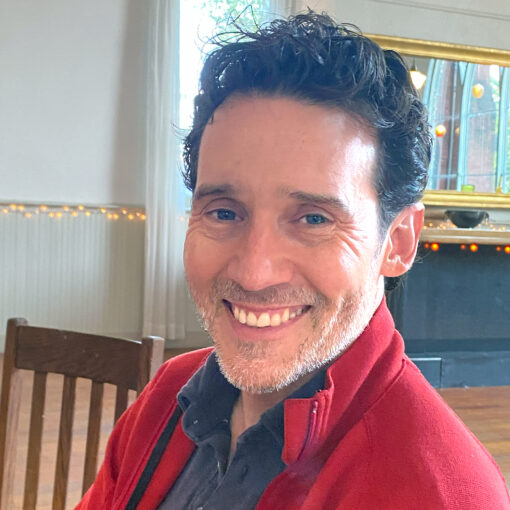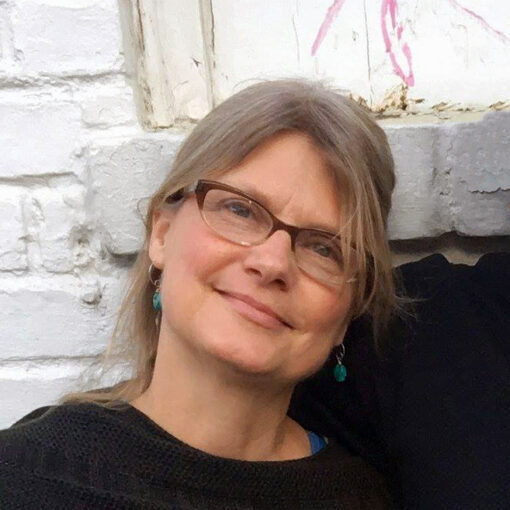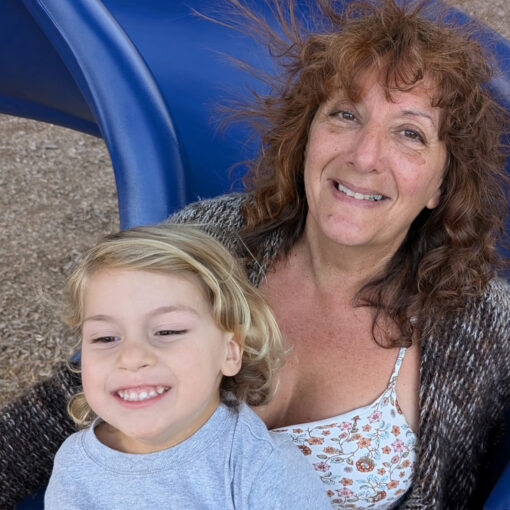Jan 12, 2025 Maria(Ma) and Dog On Fleas and spouses: Chris(C), Michelle (Mi), John (J), Dean (D), Stephanie (S)
C: I’m Chris and a few of the things that I love about Rosendale and Ulster County are the rising tide of local agriculture, the rising tide of local art output and music and people creating it, as well as events and things where you can go enjoy it with your neighbors. And all of the above, I like the community part of it where you can go to the farmers market, go to the farm you can go to the theater, you’re gonna see some people you know, you’re gonna chitchat. Yeah I just like that.
M: Why?
C: Because I think if you have more of a feel for people that you have contact with, regardless of how diverse divergent your politics or your background or anything might be, it’s really very gratifying and empowering to cultivate friendships with with somebody who you might really think comes from a different place, and is a different type person to find some common ground with them. The only way you can do that is if you have these areas where you can rub elbows and interact. I hope to see that continue to flourish rather than recede. Rich people who come up from the city, sometimes they’re cognizant of what’s going on up here, and I think they should be brought into the fold too, you know.
Mi: I’m Michelle and what I love about Rosendale is as a microcosm of Ulster County. I think that there are lots of communities like this in Ulster County, but what I love about Rosendale is the feeling of pride that people have for where they live. It’s not a materialistic pride, it’s kind of a feeling pride, it’s a connected pride. The people feel proud of being held by this community. What I love about Rosendale is also the fact that I’m sitting here with some friends at a table talking about what I love about Rosendale. There’s a lot of friendship and gathering and at a time when so many people around the country are lonely, don’t have friends. There’s a feeling that this is a town where people are connected and seen and held. That’s really exciting, and, like Chris, the creative output – the sense that there are so many people doing interesting things in this tiny little place.
J: I’m John and. I’ve had too much coffee to speak properly. A lot of my experience in Rosendale is kind of framed from a geographical perspective. I was a geography major, and I’m always drawn to maps and territory and sort of a frame to help me understand places. Rosendale and its origin was as a pirate town, in other words: it was not here. It captured land from the towns of New Paltz, Esopus, and Marbletown, if I have it right, it claimed territory by an edict from the state because it was such a concentrated mining district. Cement mines [are] very rich income generating ventures, numerous ventures, and so to kind of have one government that was administering the political aspects of all that potential trouble and criminality or whatever, and wealth, was to create a town out where there was none. And so that piracy I think is part and parcel of Rosendale’s identity to me. And from the mining days there has been a lot of outlaw behavior and a lot of outlaw culture – a mining town is pretty hard to control. It’s not a sleepy town. Loud law-breaking, smoke-filled, boom-boom-rah! a lot of screaming. This is not like Bedford or somewhere. And in Rosendale, because it’s created as mining district, there’s there’s almost no buildable land, that’s why there’s not a ton of pressure to move here because there’s nowhere to move to. Everything’s like wet rocks for the most part. So we’re kind of who we are, and we’re untamable in a sense, Rosendale people aren’t going to be like regular commercialized folks. I think we’re kind of doomed to be Bohemian in a sense. And from my perspective that spirit helps generate like “well let’s make stuff then and we make our own culture as we go,” we make our own music. This the town is small enough and therefore malleable enough to, in a small way, move the culture to where you want it. You can have agency and power to direct where we’re going to be, culturally. That’s why I got into politics, because it seemed like following Jen Metzger’s model, you could actually get involved and actually make progress. You can make better things better for your community. Rosendale has that available. If you want to get something going and get other people involved, you can change things! That’s my speech!
M: Just responding to that, since I’ve done these interviews before, I’ll just say one of the things I love about Rosendale, and it’s interesting following up on the “piracy aspect” is that, the let me see if I get this right, the village of Rosendale was was “vanished” by an act of conceptual art back in the 1970s as an art project. Apparently the village and the town were super imposed on each other the way they are around here sometimes and they were in continuous conflict about responsibilities. This conceptual artist decided he could fix it. That he could be the unity ticket. He got himself elected mayor, and he brought all the sides together and they disincorporated the village, and then he quit. And he lives out in Utah. I forget his name [Raivo Puusemp] but I love that story. I love that the town has such a unique background. It gives it a really kind of cool identity.
D: Dean, Rosendale New York! Just thinking about the land that’s here – we’re really blessed! We’ve got Joppenbergh and the rail trail, the different places you can set out to to hike. It’s a lot of dog walkers and it’s great to meet up with the other dog walkers and non-dog walkers in the various hiking spots and the places you can be. We kind of run into the same couple of people on these trails. You can have a pretty nice little behind-the-railtrail-loop and not see anybody, it’s nice to not see people, and then it’s nice to see people. So I think Rosendale is the best of both worlds: you can pick a place where you if you don’t want to see anybody you can find that, and you can also find people and be like “oh actually, we’re running into people we like here” Another thought – I’m seeing some of the younger folks come, or the next generation coming back around, coming back in here that’s nice.
M: Why is it nice to see that for you?
D: People you knew as three-year-olds or something, and then you see they have kids. They’re moving back and have kids. It’s just a nice nice phenomenon. I think often people leave where they grew up, and some people come back but it’s nice to see nice to have that. What else about Rosendale? It’s a wacky little town. We’ve been going to Marty’s [gym] on Main Street, she’s a character. She talks about all the famous people she trained in the city, and she’s here. She’s moved here, and it’s like quirky people who are like “oh I think I could work out in Rosendale”. It draws in those people who fit in, become part of it.
S: I’m Stephanie. Let’s see. What I like about Rosendale. I love the Rosendale Theater – if that ever went away I don’t know if we would still be Rosendale. We can kind of handle the Rosendale Cafe leaving, but not quite, it’s definitely a loss. That was like part of what made Rosendale Rosendale, but I guess things change. I’d say the Rosendale Theater, all the different programming and theater and music and everything that happens there. It’s really unique, and there’s only a handful of single-screen theaters in the whole country. I really appreciate that, and what Dean was saying, that we we just love that there’s these amazing hikes that take five minutes to get to and then you’re in the middle of the woods and you don’t see anybody and we’re always just like “I can’t believe this is so beautiful, and so accessible!
What’s the other thing I had in mind? I love the Rosendale Street Festival, but I have mixed feelings – it’s kind of like a love/ hate thing. It’s so Rosendale, but festivals aren’t necessarily my thing yet “it’s the Rosendale Street Festival!” These things that are part of Rosendale. Like Bill Brooks! He happens to be my landlord for my business, but he’s had that barber shop for 55 years. He’s such a character! Bill is Rosendale to me – such a character, you would not meet a more good-hearted person than Bill Brooks. He’s very loquacious. Oh, this is going to be [public]. I think he’d take that as a compliment! He’s the town historian. Now there’s a Rosendale Facebook group. I do have a feeling that everyone would be there for each other in a time of crisis, or a time of need, regardless of political whatevers or differences. This community would come together to help each other, and does come together to help each other. I always feel that way, that we’re here for each other. Like Chris said, all the arts and music and, yeah there’s something something special in these “wet rocks.”
Mi: I was also thinking of the Women’s Studio Workshop, to which some people come from all over the world, and then there is also a Buddhist monastery – we like a lot of stuff, it’s right here and maybe take it for granted. The loss of the Cafe is a big thing, we have to recapture
J: and even the loss of William’s Lake like it used to be – all the locals were like beach club members…
Ma: This round is: what are your wishes and ideas for Rosendale and why?
Mi: I actually really hope for more young people to stay and join the community because I think that continuity is really important, and we were noticing and seeing towards the end of John’s singer-songwriter night that increasingly there were just gray-haired people at the Tuesday night gatherings. Not only do we need it for continuity but we also need it because millennials and gen-Zers have things to say and contribute that are really different from what we have to say and contribute.
Also I want to say it’s something about the fact that we have these towns, these little hamlets, and it’s a very European way of developing a community, because they’re walkable, you live next to people you live in a community, you’re not in a bedroom community where people are spread apart and pulling into driveways and going into their garages and then they don’t even see each other from the street. We have post offices in these hamlets so people are out walking to get their mail and that’s where you rub elbows with all different kinds of people. That’s what makes it possible for us to be us, because we are a pedestrian, we have these pedestrian environments. We do have the drive from place to place – but we live in these pedestrian environments, whether it’s Tilson or Bloomington or Maple Hill
Ma: Or even Bruceville
Mi: or Bruceville.
Ma: We’re just a little group of houses, and people walk up and down and see everybody.
Mi: I think however we manage to develop – and we need to add housing somehow – I hope it holds the integrity of these little pedestrian pockets where we live because that’s so important
Ma: I never thought about the hamlets that way before – it’s so smart.
Mi: It’s actually not my idea, it’s this guy Al Frommer, the travel writer, who talked about how important living in places where you walk around [is]. He was really indicting bedroom communities for this reason, because they become pockets of class, they become pockets of people who are seeking a particular affluence, or whatever it is. In little pedestrian villages, all different kinds of people live there. So that’s something that I really love about where we live, and I hope that we can, as we expand, also expand based on those principles.
J: I’m just riffing off what you said – the right and the hamlets are conceived strongly in the comprehensive plan that was drafted and adopted by Rosendale in 2007 maybe, and there’s a lot of visionary aspects of the comp plan if you ever read it. It’s up for renewal. Isn’t that what this project is about?
M: It’s a grassroots version – we have looked at the comprehensive plan as a starting point.
J: This is all tied together, organically you build from the smallest set upward, so hamlets gather identity and interchange between persons and then the town can get that kind of integrity or mutual exchange and involvement together, so that we’re not subject to be a commodity human settlement that’s like Long Island or somewhere. One of the new laws in Rosendale, one of the newest laws is the accessory dwelling unit law making them allowable. That’s all about expanding – it’s known nationwide, statewide, countywide, that there’s a housing crisis. There are not enough places for people to live. There’s homelessness and or lack of housing and there is the financial pressure of not being able to afford to live. By making more housing available, more young people can live here. When we were first here in the early days, Main Street Rosendale was a Bohemian settlement with all this creativity because you could pay $150 per person to share a house. That makes sense – people can live a reasonable life, can be a young creative person, have a job just so that you can be creative and functional. We have to make that happen again. This is a project! You’ve got to get on it, because the boomers took everything culturally from the get go from the 60s onward, “Alright! We want all the money! We’re going to be all conservative now!” Now we have all the money and hold it! Everybody behind them’s like “hey could you just try to give a couple of crumbs?” Life is going to be so much more rich and interesting and challenging and eye-opening and exciting when young people can take the helm again. Because our shit is tired!
M: the people who are living on Main Street, the youngish people, the 30 and even 40 somethings, are struggling because their rent is getting jacked up.
D: I don’t know how much I have to say. Young people: bring them on! I think we do need more new blood to go with the old blood and the loss of the cafe is … It was great to be at the Muse last night seeing great music and maybe that’s a viable [venue]. I’m just hoping to be able to roll down the hill or wherever and there’s something happening. So more things like that would be great. There’s the theater which is great and I just heard the Garden House may have some live music in there too.
S: I would like it if the town would shovel the sidewalks on Main Street. It’s really dangerous for people, so I don’t know why that can’t happen
C: Isn’t it required of building owners?
J: Yes, but they’re too slapdash. Some people just don’t – enforcement’s hard.
S: More sidewalks everywhere would be great, too, to increase ability to get around without a car would be really nice whatever way that could get done, whether it’s like a local Rosendale shuttle ….
Ma: What if we took away the parking lane on Main Street to make the sidewalks broader and to slow the traffic. Make the road narrower?
S: Parking is a problem too, unfortunately for the businesses on Main Street. Something to make getting around like a Rosendale shuttle bus or something easier would be nice. I do wish the Rosendale government was trying to involve the community more, like making an effort to let people know what’s going on on the government. In New Paltz the mayor like writes a letter to the editor every week that’s published in the paper: this is what’s going on in local government. I feel like most people don’t know what our local government does, don’t really know what’s going on, and what the issues are, and people are busy I think. It’s up to the government officials to live stream the board meetings, to make an effort to include people, so I’d like to see more of that. And then I wish wood fire boilers were illegal! Those are awful – the smoke they admit is right at street level so I’m walking my dog and I’m just inhaling those particulates and feeling the cancer developing. You can’t do new ones but the old ones are grandfathered in so we have quite a few in our neighborhood.
S: There was a patch of woods that got torn down in our neighborhood and they burned all the wood and our neighborhood was filled with smoke. There’s stuff like that that I wish there was more regulation around. This is my other idea: I wish there was a set time each week where everybody mowed their lawn like Saturday 12 to 4 you can do all the noisy things we want. Maybe two area time slots per week that everybody does their lawn work, and then we are quiet. I enjoy living in the country. But I don’t actually feel like I live in the country because it’s just so noisy all the time. People would never go for that because it’s too “government control” or something, but, just in our neighborhood at least, I wish there was a little more thoughtfulness around what impacts your neighbors, specifically with burning things and noise from leaf blowing, lawn mowing. Those would be my wishes
Ma: Does anybody have anything they’d like to add?
Mi: One other thing: a bigger library. The Library is amazing! The new director there- she’s not new anymore – but she’s just transformed that place. If they had more space they could become such a community hub for all ages, if we had like a library with like different study rooms and like so much potential there
S: If you go you go to Olive or even New Paltz, I tutored in New Paltz for a year and there are study rooms you can go into, Elting Library is really a community hub.
Ma: I wonder about the school at St. Peter’s you know?
Mi: That’s a good idea, in our neighborhood is the old Tilson elementary school. Hopefully they’ll build affordable apartments there. Building in spots where there’s already been a building so that you don’t have to knock any trees down or anything is perfect.
Ma: Anybody else? All right, thank you so much!




